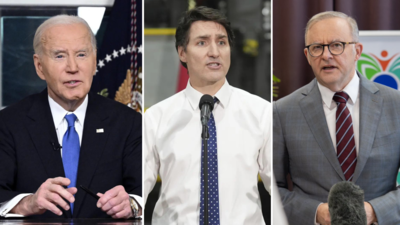
US President Joe Biden, Canadian PM Justin Trudeau, and Australian PM Anthony Albanese (Picture credit: Agencies/X)
Left-wing political parties across the world are experiencing their lowest levels of support since the
Cold War
era, according to a comprehensive analysis of recent elections conducted by the Telegraph. The study, which examined 73 democratic elections held globally last year, found that left-leaning parties secured an average of just 45% of votes, with even lower figures in the United States and Western Europe at 42%.
In contrast, right-wing parties have garnered an average of 57% of votes, marking the widest gap between the two political ideologies since 1990. This trend has been further emphasized by the landslide victory of President-elect Donald Trump in the United States, who secured 77 million popular votes compared to vice president Kamala Harris' 75 million.
Experts predict that the decline in popularity of left-wing parties is likely to continue, with upcoming elections in Canada, Australia, and Germany expected to see similar losses for progressive candidates. Professor Matthijs Rooduijn, a political scientist from the University of Amsterdam, told the Telegraph, "The trend is up. There is no real reason to expect that it will stop anytime soon."
In Canada, polls indicate that conservative leader
Pierre Poilievre
is the frontrunner to replace Prime Minister Justin Trudeau, who recently announced his resignation. Similarly, Australia's conservative party has taken a slight lead over the ruling progressive government ahead of the country's upcoming election later this year, according to The Telegraph report.
Experts attribute the rising popularity of right-wing parties to several factors, including hardline immigration policies in the US and parts of Europe. Jeremy Cliffe, of the European Council on Foreign Relations think tank, identified three additional trends, as quoted by the New York Post: "The globalization-driven decline of organized labor, rising identity politics harnessed more successfully by the Right than the Left, and a general tendency among Leftist forces to fragment rather than unite."

 8 hours ago
1
8 hours ago
1










 English (US) ·
English (US) ·